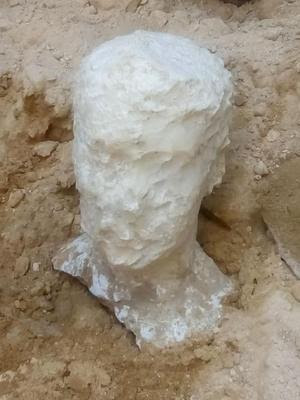 |
| A black granite sarcophagus discovered during a search in Alexandria. |
A black granite sarcophagus has been unearthed in Alexandria. Buried for over 2000 years, it has never been opened.
More than 2000 years underground it uses a little ... Yet this black granite sarcophagus, recently discovered in Alexandria seems almost intact. As happens quite regularly, it was the Ministry of Antiquities of the country that announced the discovery on social networks, without giving further information. Neither the precise date of the discovery, nor the dating of the sarcophagus (we know only the period), nor even the name of the team in charge of the excavations were communicated.
More than 2000 years underground it uses a little ... Yet this black granite sarcophagus, recently discovered in Alexandria seems almost intact. As happens quite regularly, it was the Ministry of Antiquities of the country that announced the discovery on social networks, without giving further information. Neither the precise date of the discovery, nor the dating of the sarcophagus (we know only the period), nor even the name of the team in charge of the excavations were communicated.
Just do we know that the sarcophagus is 265 cm long, 185 high and 165 wide (which makes it one of the largest discoveries in Alexandria) and that it was found with a marble bust, probably the one from its owner.
 |
| A bust accompanied the black granite sarcophagus |
"This is not the first time a sarcophagus of this type has been discovered," explains Ivan Guermeur, researcher at the CNRS and director of the Egypt Nilotic and Mediterranean team at Université Paul-Valéry in Montpellier. "Most date back to the same period, around the 30th dynasty, in the 4th century BC. This one is probably a little more recent, since we know that it dates from the Ptolemaic era. "The Ptolemaic period covers a broad period of about 330 BC. BC to 30 BC This is the only chronological indication we have for this block of granite. Another special feature is that the sarcophagus was never opened in 2000 years. "It is indeed something quite rare, because many sarcophagi were looted during Antiquity," says the French researcher.
No inscription having been discovered, impossible to know which secret is hidden in the block of stone. The size of the sarcophagus and the bust would indicate, however, that the person buried in the coffin was of a high social status. "Some pictures show that the sarcophagus was discovered in a very humid environment. Which could have ruined the content, "regrets Ivan Guermeur.
Hellenistic empire
The city of Alexandria contains innumerable buried treasures, although the urban context makes excavations quite complicated. "Most of the time, discoveries are the result of life-saving excavations," explains Ivan Guermeur. "The government is destroying villas to build big towers, and at the time of the destruction the excavations are carried out."
Hellenistic empire
The city of Alexandria contains innumerable buried treasures, although the urban context makes excavations quite complicated. "Most of the time, discoveries are the result of life-saving excavations," explains Ivan Guermeur. "The government is destroying villas to build big towers, and at the time of the destruction the excavations are carried out."
Founded in 331 BC J. - C. by Alexander the Great, the city was the capital of the Ptolemaic kingdom. "It was a Hellenistic empire that did not break with the arrival of the Romans," says Ivan Guermeur. "Until the end of the empire, culture remained very Greek. Most of the sources found are essentially written in Greek. But we also found some texts in hieroglyphs. "After conquering Egypt, Alexander named Ptolemy, one of his trusted officers, governor of Egypt. A few years after the death of Alexander the Great, Ptolemy proclaimed himself king of Egypt and founded a dynasty that ended in the suicide of Cleopatra.



